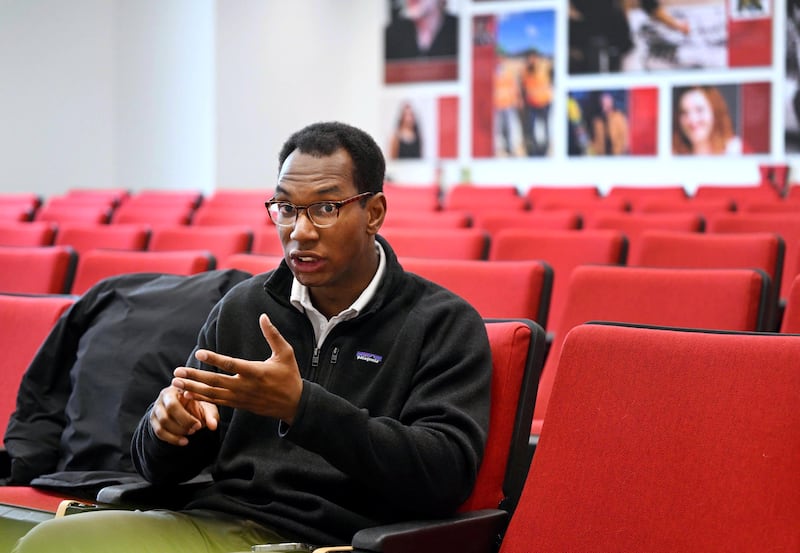Removing his earbuds, Keimon Dixson tuned in to the discussion going on in his class about race and politics in America.
As the conversation strayed into generalizations about the country’s Black population, Dixson, a senior studying political science at the University of Utah, and the only Black student in the room, interrupted to point out the diversity represented within identity groups — as showcased by his own background.
But Dixson was told he was “not a normal Black person,” by one of his peers.
“I didn’t know how to take that,” Dixson said a week later in an interview with the Deseret News.
Four years into his undergraduate education, which was preceded by three in the United States Marine Corps, Dixson is still occasionally thrown off by his classmates’ comments as well as the ideology he says reinforces their assumptions — an ideology Dixson has increasingly come to identify with “diversity, equity and inclusion” initiatives on campus.
What is DEI?
Diversity, equity and inclusion, or DEI, refers to policies meant to “level the playing field” in colleges, schools or the workplace with a focus on groups that have faced historic discrimination. It can take the form of diversity statements in hiring, employee trainings, and programs intended for particular ethnicities or identity groups.
But for MJ Powell, a Salt Lake native who came to the University of Utah as a first-generation college student on a diversity scholarship awarded through the university’s Equity, Diversity, and Inclusion Division, the nuance is lost when DEI efforts are reduced to an acronym.
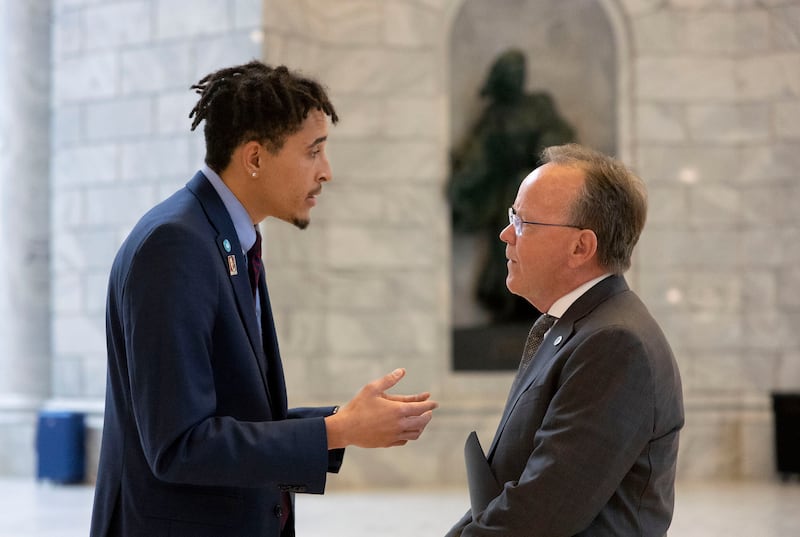
Powell, like Dixson, is a senior studying political science, and previously worked as a DEI intern for the Utah Jazz, a racial equity commissioner for Salt Lake City and an administrative assistant to Salt Lake City Mayor Erin Mendenhall.
He said that DEI includes all efforts to create a welcoming and accessible work or study environment, whether for minority ethnicities, LGBTQ individuals or those with disabilities, like his father, who needed special accommodations as an injured veteran after being deployed as a staff sergeant in the Marine Corps.
“If I can see that someone needs a little support, and a pattern or a methodology that meets them where they’re at, I should do so because that’s part of my beloved community,” Powell said, later adding that the funding and spaces provided by DEI allow students like himself “to come to campus and thrive.”
Such efforts are popular among a plurality of Utahns, according to a recent Deseret News/Hinckley Institute of Politics poll.
When asked whether the establishment of DEI offices in public institutions and private businesses make the state better or worse, 45% of respondents said DEI programs have had a positive impact on Utah, 24% said the effect on the state has been negative, 17% said DEI offices haven’t made a difference one way or the other and 13% said they didn’t know.
The poll was conducted from Jan. 16 to 21, with a sample size of 801 registered Utah voters. The margin of error is +/- 3.02 percentage points.
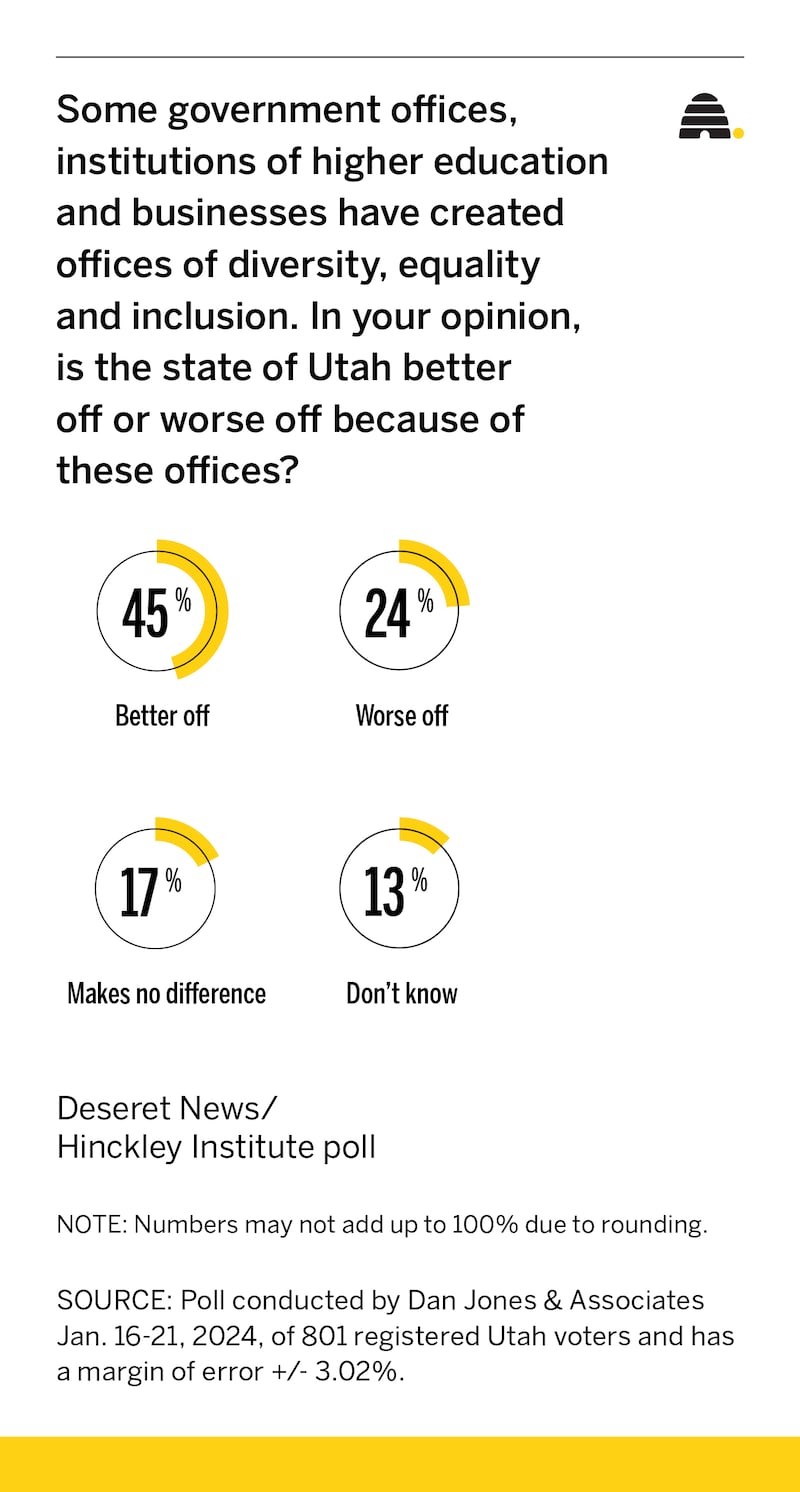
Despite the favorable connotation associated with words like “diversity” and “inclusion,” DEI has become a flashpoint in the national culture war, with outright bans on DEI funding or hiring requirements on university campuses recently becoming law in Florida, Texas, North Dakota, Tennessee, North Carolina and Wisconsin.
While proponents of DEI programs say they aim to redress societal disparities and help participants feel safe and welcome, others argue DEI initiatives may rule out conservative viewpoints and have little to no positive effect on actual inclusion.
“The biggest issue with DEI now, and its messaging, is it makes it seem like race is to determine your outcome in life,” Dixson said.
The “demoralizing” experience of being placed into a category because of his appearance — something Dixson said he has experienced numerous times since moving from his native Georgia — is what motivated him to testify to a Utah Senate committee last month in favor of a bill, HB261, that would ensure student success resources are available to all “high-risk” individuals while prohibiting DEI practices that discriminate based on race, religion or sexuality.
Dixson, the national committeeman for Utah Young Republicans, told state lawmakers that DEI initiatives rest on the assumption that minority populations are unable to succeed in a meritocracy because of systemic barriers.
He called this view “utterly disrespectful and condescending,” saying it had filtered down from academia to the student body, with several students, professors and administrators telling him at different times that his academic and professional accolades must have been given to him because of his skin color.
“Everyone should be appreciated for their abilities and achievements, not reduced to their racial or ethnic identity,” Dixson said at the public hearing.
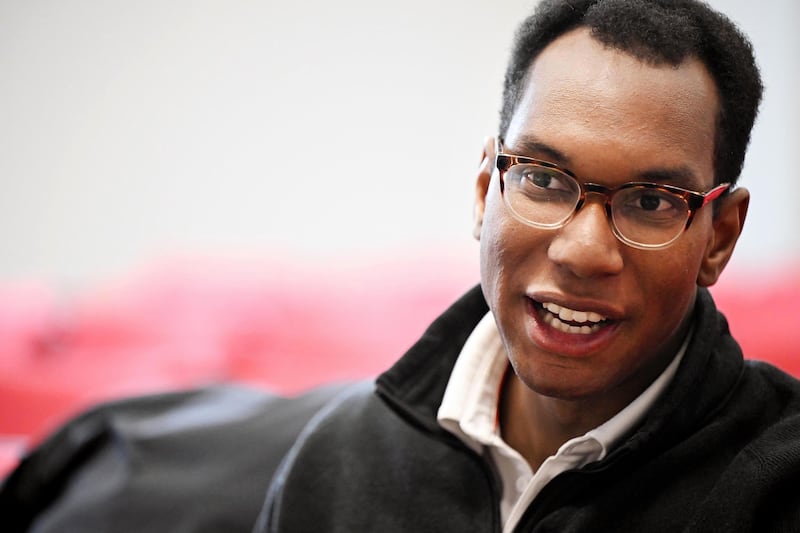
What does Utah’s new DEI law do?
The bill in question, Equal Opportunity Initiatives, advanced rapidly through the Legislature this session, becoming one of the first pieces of legislation signed into law by Utah Gov. Spencer Cox on Jan. 30.
Beginning on July 1, updated state code will outlaw DEI trainings, requirements, programs and offices at public universities, schools “or any other institution of the state” that engages in what the legislation calls “prohibited discriminatory practices.”
Prohibited practices include policies that promote differential treatment in hiring, admissions or program participation based on “personal identity characteristics;” that assert “meritocracy is inherently racist or sexist;” or that require an applicant to respond to questions about DEI, anti-racism, critical race theory or intersectionality, among other topics.
Public entities will be required to maintain neutrality on political topics under the new law, and institutions of higher education will be required to conduct trainings and surveys focused on free speech in addition to ensuring access for all students to student success resources.
State funding can be withheld if institutions fail to address violations of these requirements.
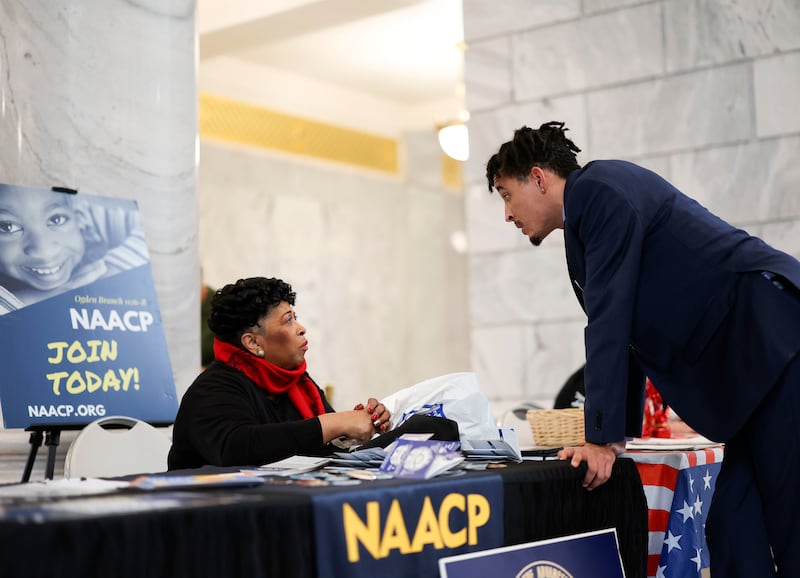
On Wednesday, Powell joined members of the local NAACP branch, to which he has served as a youth leader, in protesting HB261 at the Capitol Building rotunda.
“This is a systematic attempt, at a national level, a partisan level, to ensure that students such as myself have that fear and misconception of what the other side is,” Powell said prior to the rally. “I don’t fear the passage of these bills; what I fear is the effect it will have on students that need these resources.”
Powell said he was one of just a handful of students of color from West High School that ended up at the University of Utah. He questioned how the prohibited practices outlined in the bill, such as requiring diversity statements, could be viewed as “exclusionary” when they are meant to ensure “that everyone, regardless of their protected identity status, will be met where they’re at and supported in the way they need to be supported.”
Nearly half, 48%, of registered Utah voters support the use of required DEI statements in public institutions, according to Deseret News’ January poll. Slightly less, 40%, either somewhat or strongly oppose the requirement, while 13% are uncertain.
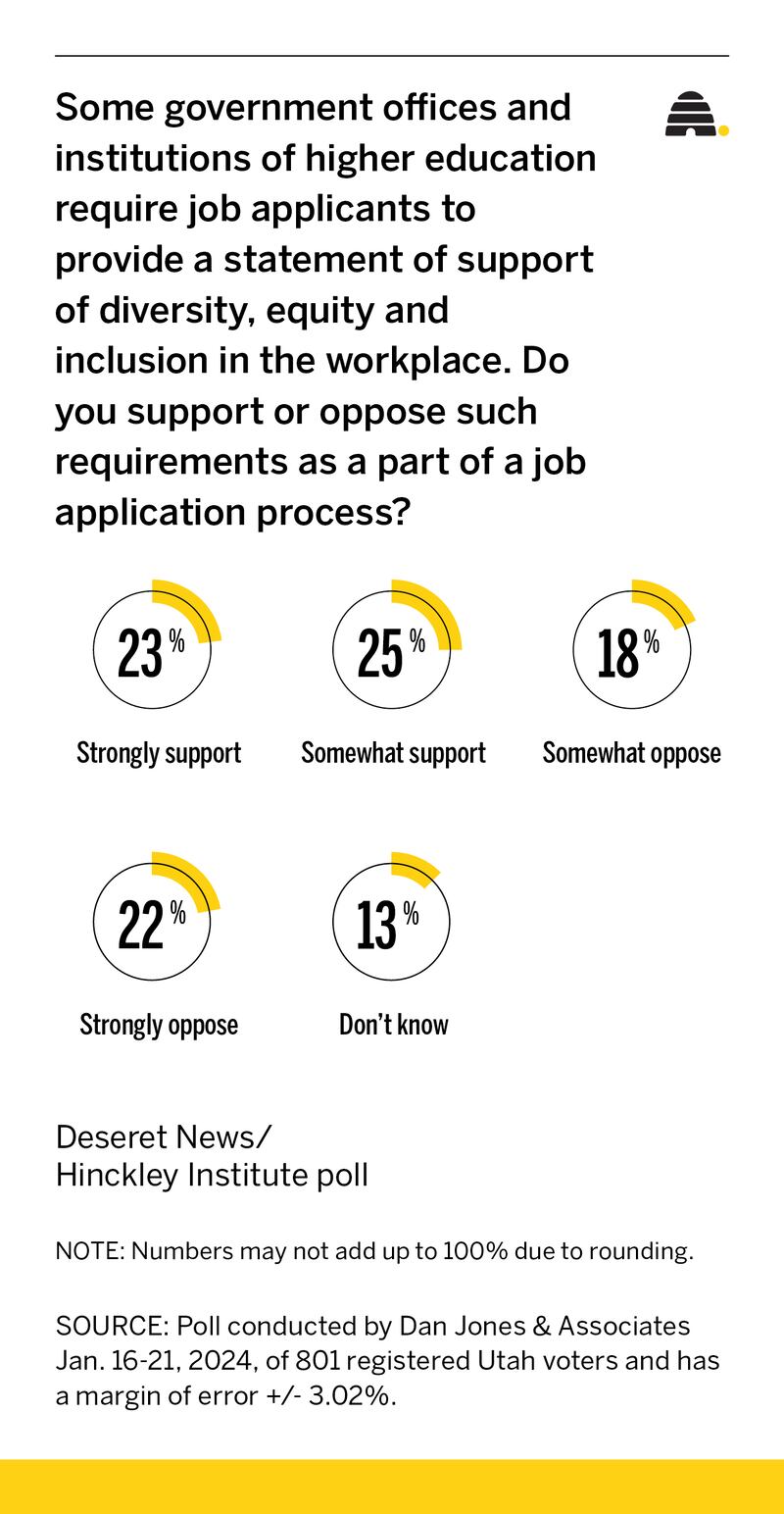
In December, Cox condemned diversity statements, saying it was “bordering on evil that we’re forcing people into having a political framework before they can even apply for a job by the state” — a statement he later apologized for.
Cox’s comments were followed shortly after by declarations from the Utah Board of Higher Education and University of Utah President Taylor Randall that diversity statements would be discontinued in hiring processes.
Utah State University began phasing out its use of diversity statements in spring of 2023.
Representatives from the University of Utah and Utah Valley University told the Deseret News that administrators were working with peer institutions and the Utah Board of Higher Education to develop compliance plans before HB261 goes into effect.
“While the bill will likely alter some of our programs and initiatives, our commitment to helping individuals transform their lives through education is resolute,” the UVU spokesman said.
Utah State University, which, like the University of Utah and UVU, has a DEI division, has issued a response to frequently asked questions about HB261, clarifying that while the name of “diversity, equity and inclusion” offices must be changed under the new law, these kinds of outreach centers, other cultural centers, course content, academic research and federal scholarships will likely not be impacted.
DEI offices at Utah’s public universities provide a variety of resources, including faculty trainings, mentorship programs for minority students, educational events and counseling services.
On Monday, the University of Utah’s division for Equity, Diversity, and Inclusion released a “scorecard” it said demonstrated the positive effects of its various programs.
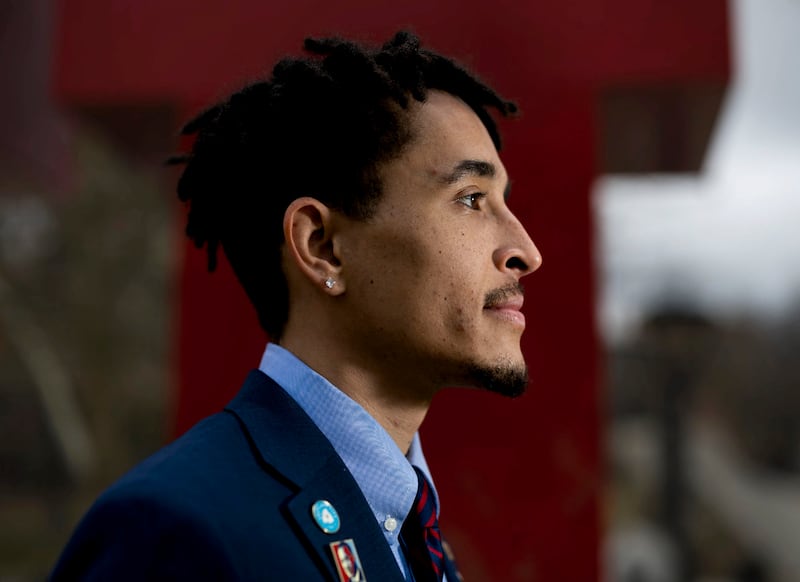
The report found that “EDI scholars,” like Powell, have a second-year retention rate of 94%, compared to 85% of all undergraduate students, and a first-year GPA of 3.43, compared to the 3.29 undergraduate average. The report also referenced a 2023 campus survey that found DEI resources and cultural centers increased students’ sense of belonging in academic, social and other domains.
“DEI offices don’t take away anything from students who don’t want or need to access them, but their absence will have a negative impact on students who rely on them,” Powell said.
In a recent essay, Cox said that DEI operations at public institutions cost the state $3.2 million year. A legislative fiscal analyst told a House committee that annual DEI-related spending totals approximately $10.4 million across the state’s 16 institutions of higher education out of their $2.8 billion budget.
The sponsors of HB261, Rep. Katy Hall, R-South Ogden, and Sen. Keith Grover, R-Provo, have repeatedly stated that no training or office will be affected by HB261 unless they violate the bill’s “prohibited discriminatory practices.” The same goes for special education programs and student groups.
You can find a summary of what the bill does, and does not, prohibit here.
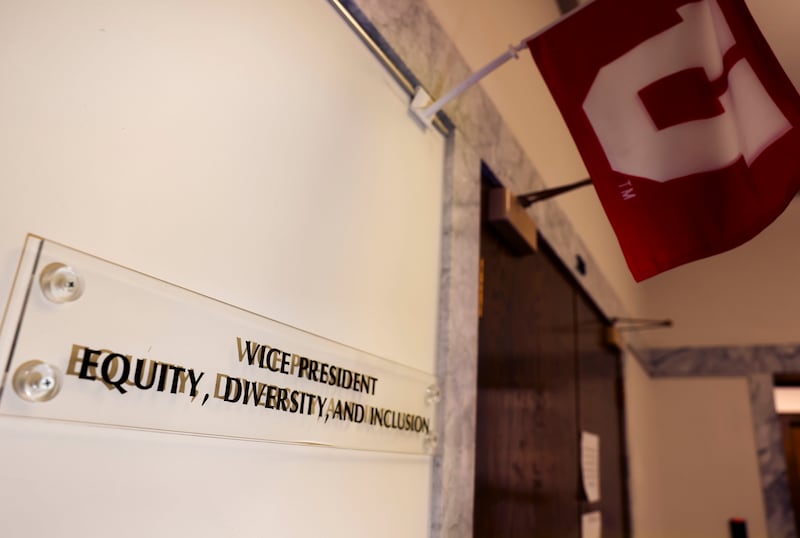
What should come after DEI?
Randall told members of the University of Utah’s Academic Senate earlier this month that HB261 would not change the values of the institution and that the university will take the time to “understand all of the ramifications before making massive organizational changes.”
He said despite having to change the name of their DEI office, employees will not lose their jobs because of the bill. He also said he didn’t believe the bill was an attempt to shut down discussions around diversity or social inequality.
“I don’t think this law was intended to keep people from talking about these issues,” he said. “In fact, just the opposite. My sense in the discussions with our legislators is they do want to create an environment where everyone can thrive and so I think talking about these things is actually important.”
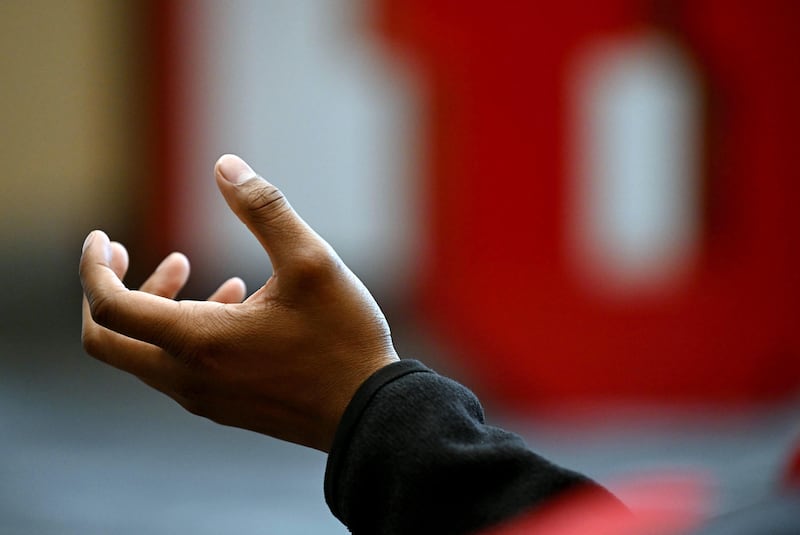
For this very reason, Utah’s bill stands apart from other attempts to regulate or eliminate DEI across the country, according to Allison Gerrard, the managing director of Moral Courage, an organization that helps individuals and institutions discuss polarizing issues productively.
“(The bill) does not seem extreme,” said Gerrard, who lives in Sandy, Utah. “I see it as an opportunity to reimagine how to do belonging and inclusion.”
While the organization has not taken an official stance on HB261, Gerrard said they are excited about Utah’s approach because in addition to banning mandatory diversity trainings, which Gerrard said have been shown to reinforce biases, the bill continues to emphasize the importance of “diversity of perspectives and experiences.”
A course correction to the way DEI has been practiced is badly needed, Gerrard said, because current programs often blame or elevate individuals based on “what identity group you’re born into,” which can raise emotional defenses and increase animosity between individuals with different backgrounds.
“It doesn’t feel good to be lumped into a group and then assigned certain characteristics,” Gerrard said. “We’ve got to move beyond labels and get to who people really are. And if we’re not doing that in the planning process, then whatever the outcome, whatever the product you create, it will not work.”
Moral Courage is currently working with Montana State University, Western Michigan University, California State University in Fullerton, University of Southern California and Utah State University on ways to champion diversity of thought on campus while also recognizing the challenges faced by different groups.
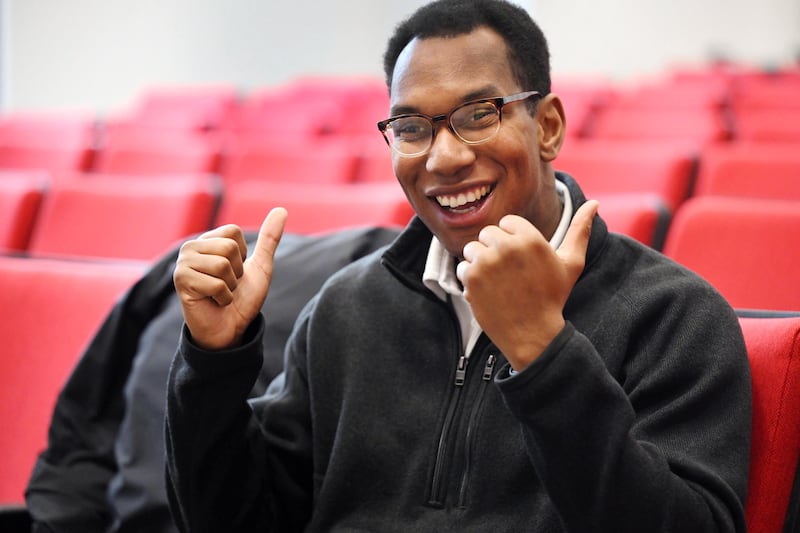
After his testimony at the state Capitol, Dixson said the University of Utah reached out to him to get his thoughts on how to better foster equal opportunity and inclusion on campus. His message? “Belonging and connection,” not segregation based on immutable characteristics, should be the outcome of diversity initiatives maintained on the public dime.
Instead of targeting certain demographics at the exclusion of others, university diversity initiatives should take steps to bring students together, away from the division of social media, in support groups made up of a diverse community and through campus forums where students can discuss the important topics of the day with a diverse set of speakers.
Resources for struggling students, he said, should be meted out according to individual circumstances, whether it be merit- or need-based, instead of identity-based criteria, which might sometimes exclude qualifying individuals who come down on the wrong side of a quota.
Dixson, whose resume includes multiple congressional internships and a political consulting position, said his parents, and both sets of grandparents — all college graduates — inspired him with a work ethic that sets him apart from others more than any external attribute ever could.
“I will never forget that I am a Black man,” Dixson said. “But I’m an American. And I’m a veteran. And I’m a son. And I’m a uncle. And I’m a brother. And I’m a future missionary. And I’m a University of Utah student. And I’m a civic engagement leader. And I’m a student leader. I have a lot of other things that encompass who I am (other) than just my skin color.”

